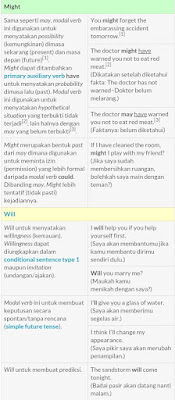Pengertian Auxiliary
Auxiliary verb adalah kata kerja yang muncul sebelum main verb ( kata kerja utama ) didalam suatu kalimat untuk memodifikasi makna dari kata kerja utama tersebut. Tidak seperti kata kerja utama, auxiliary verb tidak mempunyai arti sendiri.
Kata kerja pembantu ini terdiri dari primary (be, do, have) dan modal auxiliary verb (can, could, may, might, will, would, shall, should, must, ought to).
Kombinasi Auxiliary Verb
Sebuah kata kerja utama dapat dilengkapi sampai tiga auxiliary verb dimana terdiri dari modal dan satu atau dua primary auxiliary verb. Contoh kombinasi pada kata kerja ini dapat dilihat pada tabel sebagai berikut :
Contoh Kombinasi Antar Auxiliary Verb :
- The children should have slept. (Modal: should, primary: have; Present Perfect Tense)
- The book has been read. (Primary: has, been; Passive-Present Perfect Tense)
- I will have been sleeping. (Modal: will, primary: have, been; Future Perfect Continuous Tense)
- I have been driving for an hour. (Modal: will, primary: have,been; Present Continuous Tense)
Primary Auxiliary Verb
Primary Auxiliary Verb terdiri dari be, do, dan have. Ketiga kata kerja ini dapat pula berfungsi sebagai kata kerja utama.
Beberapa Contoh Penggunaan dan contoh Be, Do, dan Have
Pengertian Modal Auxiliary Verb
Modal Auxiliary Verb adalah kata yang di tempatkan sebelum main verb (kata kerja utama) untuk memodifikasi makna dari kata kerja utama tersebut. Fungsinya untuk mengekspresikan willingness (kemauan) atau ability (kemampuan), necessity (kebutuhan), dan possibility (kemungkinan). Kata kerja bantu ini antara lain: can, could, may, might, will, would, shall, should, must, dan ought to (phrasal modal verb).
Fungsi dan Contoh Kalimat Modal Auxiliary Verb
Pengertian Phrasal Modal Verb
Phrasal modal verb adalah modal yg biasanya dimulai dengan to be atau have dengan/tanpa diakhiri dengan to. Modal sendiri merupakan kata yang muncul sebelum main verb untuk memodifikasi makna dari main verb tersebut dimana kata - kata seperti can, could, will, would, may, dan might disebut one-word atau single modal juga diikuti bare infinitive (kata kerja bentuk dasar).
Fungsi dan Contoh Kalimat Phrasal Modal Verb
Exercise :
- How ____ you have left the bathroom in such a mess ?
- Mat _____ be lazy but he is certainly not stupid.
- I _____ speak Swedish, Dutch and Japanese.
- I think we are lost. The man _____ have given us the wrong directions
- You ______ be serious about swimming outdoors in winter.
- Plants _____ have sunlight in order to make food.
- Since our bags are identical you _____ have taken mine by mistake.
- Parents _____ take care of their children.
- _____ you excuse me for a moment ?
- She _____ stay up late if she takes a nap now.
Answer :
- Could
- May
- Can
- Might
- Can't
- Must
- Could
- Ought to
- Would
- Can
Reference :
Www.englishdaily626.com/modals.php?001
Www.wordsmile.com/phrasal-modal
Www.wordsmile.com/pengertian-contoh-kalimat-modal-auxiliary-verbs
Www.wordsmile.com/pengertian-penggunaan-contoh-kalimat-auxiliary-verbs
Febby Rachmadania
12612845
4 SA 05









